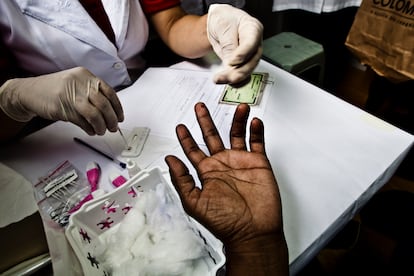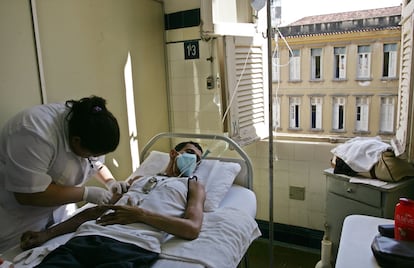HIV infection in six transplant patients in Brazil points to nepotism and greed of a laboratory
Health authorities in Rio de Janeiro are reviewing samples from 288 donors after discovering that two HIV-positive people were declared fit to be organ donors


A Brazilian woman who has been living with someone else’s kidney for several months received a call on October 3 asking her to go to her clinic to undergo an HIV test. The test was positive. Without much explanation, no medication, or any kind of guidance, she was given an appointment for a medical consultation at the end of the month, as she told anonymously on the television program Fantástico a few days later. Eight days later, she discovered in the news that her case was not unique. She is one of six patients who received organs from two deceased HIV-infected patients who were wrongly declared suitable for donation in Rio de Janeiro. The first results of the investigations point to the private laboratory to which the public health system subcontracted the tests for donor suitability. Suspicions about the motives point to a combination of nepotism and greed.
The six transplant recipients left the operating room with a new heart, a new kidney or a new liver and, without knowing it, also with a chronic infection that weakens the immune system and requires lifelong treatment. They were infected by deceased donors, a 28-year-old man and a 40-year-old woman who, it has now been discovered, were HIV-positive. It was a major scandal, revealed by the media outlet Bandnews, which fell like a bomb in one of the countries that performs the most transplants in gross figures and which manages the largest public health system in the world, the SUS. The first suspicions arose when one of the recipients became ill and the doctors could not find the origin of his symptoms until someone thought of doing an HIV test, an infection that he did not have before the implant.
Since health authorities keep samples from donors, the State Institute of Hematology is re-examining samples from 288 donors whose remains have been transplanted to others since last December, when the suspicious laboratory began carrying out the tests. The results of the tests were promised for last Friday but have not yet been released.
The scandal has the potential to escalate: “Those under investigation issued dozens of false positive and false negative results for HIV, including in tests on children,” one of the investigators from the Public Prosecutor’s Office warned on Friday, reports O Globo. On Monday, authorities announced the dismissal of the entire management team of the State Health Foundation, which manages health units throughout the state of Rio.
Last year, Brazil transplanted more than 9,200 organs, including kidneys, livers, hearts, lungs, pancreases and intestines, as well as thousands of corneas and bone marrow. Patients who received corneas from deceased HIV-positive patients did not become infected with HIV.

The Ministry of Health first heard about this on 13 September, three weeks before the woman with the new kidney was asked to take an HIV test. When the scandal broke in the press, Health Minister Nísia Trindade announced an investigation: “What happened is very serious. I am outraged because this is not supposed to happen, but once it happens, it has to be investigated. We are going to review all the work procedures, the analyses, the errors.”
The fact that two infected donors were discovered was a sign that this was not a one-off false negative. Immediately, all eyes turned to the private laboratory PCS Saleme, which 10 months earlier had begun to carry out analyses on commission for the public health system. The company belongs to two relatives of a veteran congressman who was state health secretary and has been linked to the health system in Rio de Janeiro for years.
The laboratory in question was immediately closed down and one of the owners and four technicians were arrested as part of one of the many investigations that were launched. One of the owners attributed what happened to the incompetence of his employees, but inspectors from the health surveillance agency point to the long list of irregularities they found at the headquarters of PCS Saleme, in Nova Iguaçu, in the metropolitan area of Rio.
To begin with, the laboratory did not have the samples properly identified, and kept them in a kitchen refrigerator. During the first inspection after suspicions began, investigators asked the workers about the kits to perform HIV tests. They did not have any. They asked them for the purchase invoices for the tests. There were none, according to the account provided by the Bandnews journalist who revealed the case. All this made them think, the reporter continued, that it was not a matter of errors, but that the tests were not even being performed. The owners of PCS Saleme are also involved in four legal proceedings for false results, according to the newspaper Folha de S.Paulo. The laboratory offered services, in addition to the transplant center in Rio, to a dozen hospitals.

Professor Ana Malik, a specialist in health management and professor of Administration at the Getulio Vargas Foundation, considers what happened “an aberration.” “It causes terrible damage to the reputation and image of the system because it generates a loss of confidence,” she explains. She adds that “it is an excellent argument for those who are against the private sector participating in the SUS [public health system, the Unified Health System].” Professor Malik points out that Brazil has a few transplant services, such as a kidney transplant in São Paulo, which are an international reference. She maintains that what happened is “an incomprehensible breach in the system of authorizations to operate any health service” because, she stresses, the criteria are strict.
Being infected with HIV is one of the reasons why a candidate for organ donation is automatically ruled out. Other reasons include testing positive for tuberculosis or the possibility of suffering from cancer.
More than 43,000 Brazilians are waiting to receive an organ, almost all of them for a kidney. It is a single list for the whole country, both for those who undergo surgery in the public and private networks. An average of 18 months pass before they receive the long-awaited phone call to tell them that, at last, there is a suitable donor. Then another countdown begins, culminating in the operation in which they receive the new organ.
Sign up for our weekly newsletter to get more English-language news coverage from EL PAÍS USA Edition
Tu suscripción se está usando en otro dispositivo
¿Quieres añadir otro usuario a tu suscripción?
Si continúas leyendo en este dispositivo, no se podrá leer en el otro.
FlechaTu suscripción se está usando en otro dispositivo y solo puedes acceder a EL PAÍS desde un dispositivo a la vez.
Si quieres compartir tu cuenta, cambia tu suscripción a la modalidad Premium, así podrás añadir otro usuario. Cada uno accederá con su propia cuenta de email, lo que os permitirá personalizar vuestra experiencia en EL PAÍS.
¿Tienes una suscripción de empresa? Accede aquí para contratar más cuentas.
En el caso de no saber quién está usando tu cuenta, te recomendamos cambiar tu contraseña aquí.
Si decides continuar compartiendo tu cuenta, este mensaje se mostrará en tu dispositivo y en el de la otra persona que está usando tu cuenta de forma indefinida, afectando a tu experiencia de lectura. Puedes consultar aquí los términos y condiciones de la suscripción digital.








































